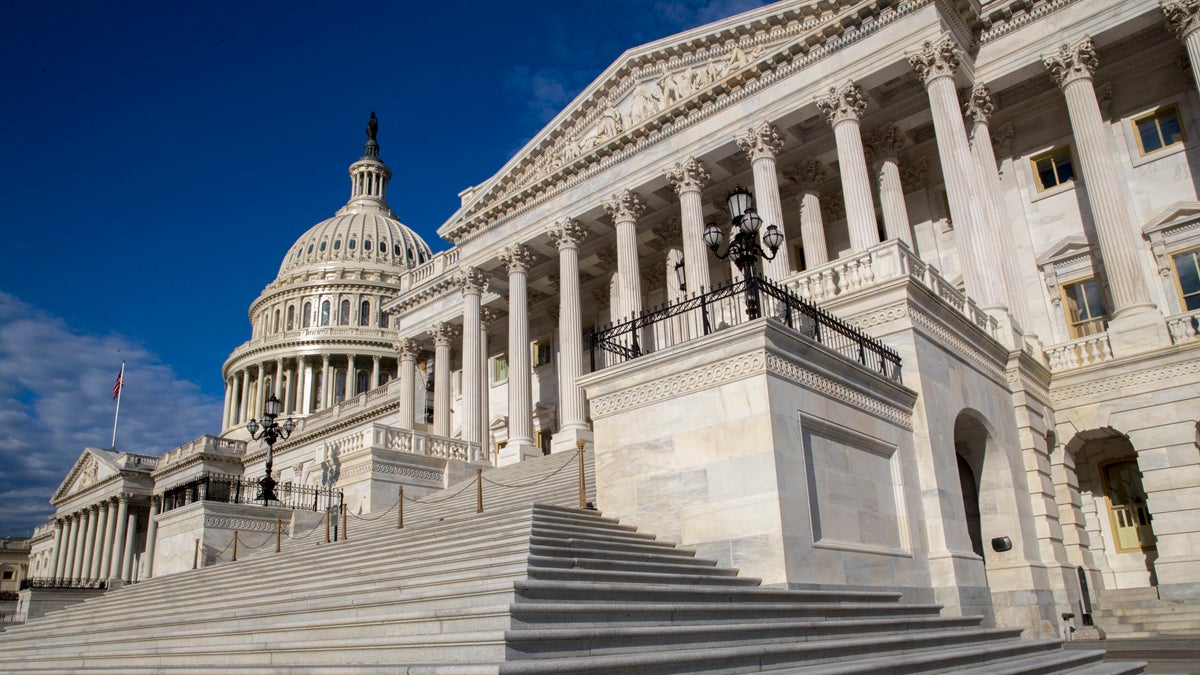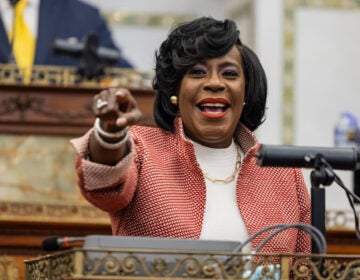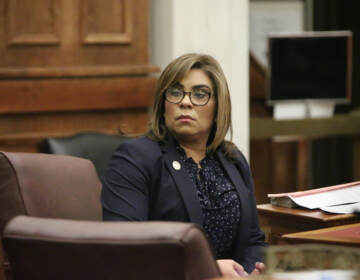Government reopens for business, but immigration fight still looms

The U.S. Senate is seen on Capitol Hill in Washington, Tuesday, June 27, 2017, as Senate Majority Leader Mitch McConnell of Ky. faces challenges within his own party this week in advancing the Republican health care bill. (J. Scott Applewhite/AP Photo)
The federal government is back open for business today, but the immigration fight that brought it to a three-day shutdown is far from over.
On Monday, Congress passed a stopgap spending bill that funds the government through Feb. 8, with Democrats crossing over to back the measure in exchange for assurances that Senate Majority Leader Mitch McConnell, R-Ky., would bring an immigration bill to the floor. McConnell said he would pursue legislation to address the legal status of roughly 700,000 immigrants protected by the Obama-era Deferred Action for Childhood Arrivals (DACA) program, which will expire in March, as well as border security and other issues.
Congress will also need to agree on a long-term funding plan in that time, and finding a bipartisan solution on immigration in the 16 days until the next deadline is far from easy.
To begin with, President Trump has been inconsistent on what kind of immigration bill he would sign, despite an insistence otherwise from White House press secretary Sarah Sanders on Monday. The broad framework is that, in exchange for a permanent fix for DACA, the president wants funding for the border wall he touted frequently during the campaign, along with an end to what he calls chain migration — or legal immigrants bringing other family members to the U.S. — and an end to the visa lottery system.
But when Trump held a bipartisan discussion with lawmakers earlier this month, he signaled he’d sign whatever bill Congress sent him, even if he wasn’t “in love with” it and he’d take any backlash from both sides. Senate Minority Leader Chuck Schumer has said he offered Trump funding for his border wall on Friday, hours before the shutdown started, as part of a deal for DACA protections, but that Trump’s chief of staff John Kelly later called to say the deal was off.
Tensions were inflamed earlier, when President Trump allegedly used a vulgarity to refer to African countries and disparaged Haiti during a discussion of U.S. visa and immigration policies with a bipartisan group of senators earlier this month.
On Monday, Sanders wouldn’t commit to whether Trump would support a path to citizenship, instead of simply legal status for the “dreamers.” That’s the common name given to those who are in the U.S. illegally after entering the country as children. For Democrats, and even some Republicans, a status short of citizenship could be a non-starter.
And even if a bill passes the Senate, it could have a much tougher time in the House, where Republicans say they will not be bound by any deal made in the Senate. The last time the Senate passed a major immigration reform bill in 2013, it died a year later in the House.
Trump did meet with six GOP senators on Monday to discuss “the next steps on responsible immigration reform.” That group included immigration hardliners such as Sens. Tom Cottom, R-Ark., and David Perdue, R-Ga., and not members of the bipartisan group who have been working to find a solution palpable to both sides, such as Sens. Lindsey Graham, R-S.C., and Jeff Flake, R-Ariz. Sen. James Lankford, R-Okla., also attended the meeting on Monday and has spoken out in favor of protecting DACA recipients.
Graham — once a strident opponent of Trump, who has developed a cozy relationship with the president over the past few months — said over the weekend that he’s skeptical of many of the president’s advisers, especially White House senior policy aide Stephen Miller, who have pushed Trump in a conservative direction on immigration as soon as he seems to want a compromise.
The president also conferred with two conservative Democrats at the White House on Monday, Sens. Joe Manchin of West Virginia and the newly-elected Doug Jones of Alabama. Upon returning to the Capitol, they said that specifics weren’t discussed, but sounded optimistic that an immigration deal could be reached.
“I think he’s very much committed to relieving this DACA challenge that we all have. I don’t think anyone wants to be in it, no one is insensitive about that. In talking with his chief of staff, General Kelly, I’m just hopeful we can find that pathway forward… The House is going to have to do their thing, but the Senate is in a position to move forward, and he’s hoping that they’ll come to something that they can all live with,” said Manchin, who faces a tough re-election campaign this November. He’s one of 10 Democrats running again in states that Trump won in 2016.
Further direct talks with Trump may have to wait. He’s slated to travel to Davos, Switzerland, this week for the World Economic Forum. The president’s first State of the Union address next Tuesday provides him a highly-visible opportunity to expand on what he wants in a bill, just over a week before the critical deadline.
While some Democrats and progressive groups said that Schumer “caved,” more moderate lawmakers expressed optimism that McConnell would keep his promise to bring a bill to the floor. That’s despite the fact that he hasn’t yet fulfilled pledges to other lawmakers in exchange for their votes last month on the GOP tax bill.
“It’s one thing to make a promise behind closed doors in a conversation. It’s another thing to be before C-SPAN and before the whole world saying, ‘I will bring a bill forward, it will be neutral, it will be an open, level, playing field.’ That’s a commitment,” Sen. Angus King, I-Maine, who caucuses with Democrats, told NPR’s All Things Considered on Monday.
9(MDAzMzI1ODY3MDEyMzkzOTE3NjIxNDg3MQ001))




